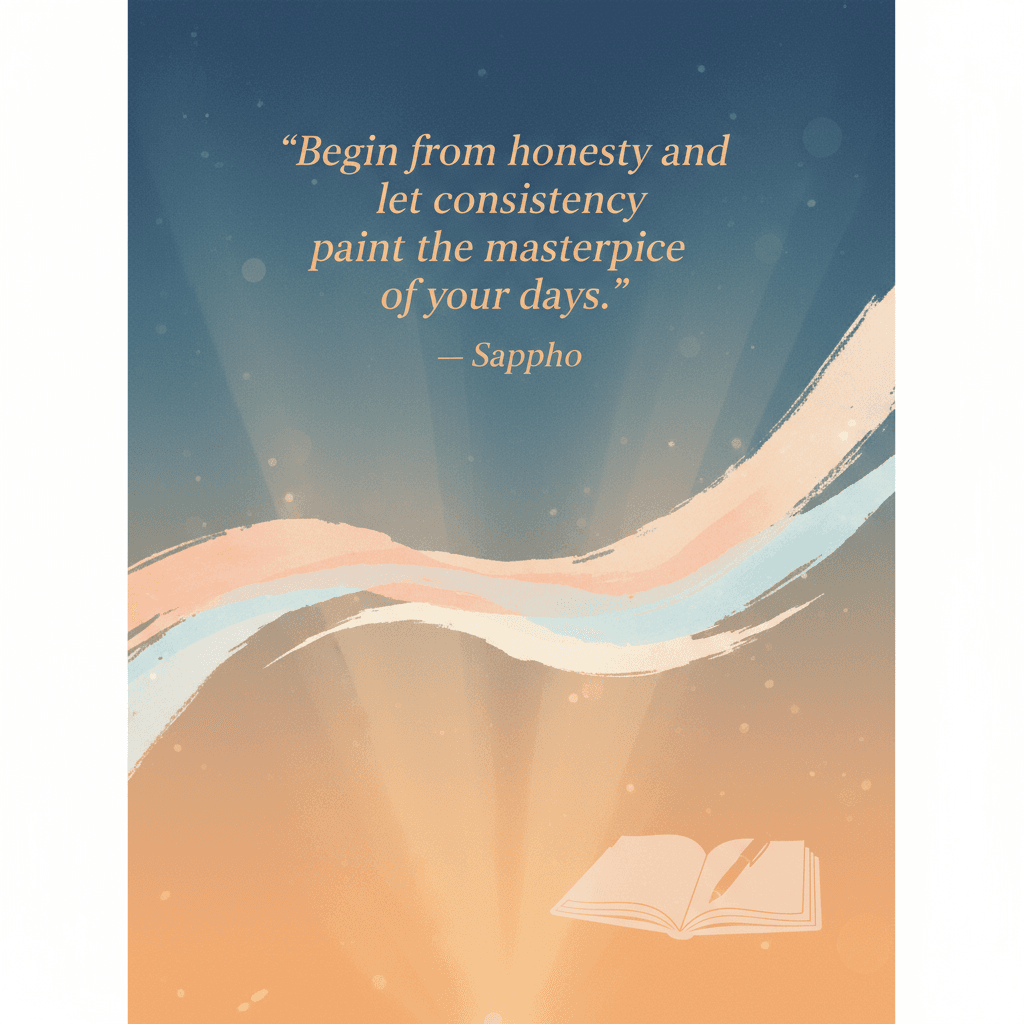Honesty Begins, Consistency Paints Life’s Masterpiece

Begin from honesty and let consistency paint the masterpiece of your days. — Sappho
—What lingers after this line?
One-minute reflection
Where does this idea show up in your life right now?
The First Stroke: Honest Beginnings
Every deliberate life starts with an unflinching look at what is true—about our motives, limits, and hopes. To “begin from honesty” is to clear the canvas, removing the primed gloss of excuses and self-deception so real color can adhere. Honesty gives direction: it narrows the field from what looks impressive to what is actually necessary. Only then can consistency do its quiet work, day after day, turning intention into form.
Sappho’s Lyric Spirit and a Modern Paraphrase
Although this elegant aphorism is often attributed to Sappho, its exact phrasing does not appear in her surviving fragments. Nonetheless, its spirit resonates with her voice: Sappho (c. 630–570 BCE) distilled feeling into lucid, disciplined lines. Fragment 31, with its trembling candor, shows how unsparing truth becomes beauty through craft and repetition. Even if modernized, the quote channels her lesson: authenticity is the pulse; technique is the measure.
Greek Ideas: Truth Unveiled, Virtue Practiced
Classical thought linked truth to unconcealment—aletheia—as if life’s task were to lift veils. Yet it also insisted that virtues harden into character through practice. Aristotle’s Nicomachean Ethics II argues that hexis—stable disposition—emerges from repeated acts aligned with one’s telos. Consistency, then, is not mere stubbornness; it is the method by which honest aims become embodied habits. Once the aim is true, repetition sculpts the self to fit it.
A Canvas Built by Layers, Not Bursts
Artists rarely finish with a single pass; they glaze, scrape, and return. Claude Monet’s haystacks series (1890–91) revisited the same motif across changing light, proving that persistence reveals nuance a single look cannot catch. In the same way, our days become expressive through layered effort: small, faithful strokes that accumulate depth. Consistency does not dazzle in a moment; it illuminates over time.
What Research Says About Habit and Truth
Behavioral science finds that stable environments and repeated cues make actions automatic. Wendy Wood’s Good Habits, Bad Habits (2019) shows how repetition in consistent contexts reduces friction until effort feels natural. Honesty supports this by lowering cognitive dissonance; Leon Festinger (1957) observed that when actions match beliefs, we experience less internal conflict, sustaining effort more easily. Thus, truthful goals and steady routines form a mutually reinforcing loop.
Integrity as Trust You Can Predict
In relationships and work, people judge integrity not only by what you value but by whether you show up the same way tomorrow. The integrative model of organizational trust by Mayer, Davis, and Schoorman (1995) highlights integrity as reliability of principles over time. Honesty declares your principles; consistency proves them visible and predictable. As trust accumulates, collaboration becomes smoother—another compounding effect of steady virtue.
Two Pitfalls: Rigidity and Flicker
Consistency without honesty hardens into rigidity—doing the wrong thing more efficiently. Honesty without consistency flickers—bright declarations that leave no warmth. Crash diets illustrate both: bold vows divorced from realistic patterns collapse into relapse. The antidote is periodic, truthful recalibration—retaining cadence while adjusting course. In practice, that means reviewing commitments with clear eyes and updating the routine without abandoning the rhythm.
Practices that Let Consistency Paint
Begin with an honest inventory: one aim that matters, one constraint you cannot ignore. Translate that aim into a daily minimum—so small it survives bad days (write 50 words, walk 10 minutes, practice scales for 5). Anchor it to a reliable cue, track streaks lightly, and review weekly to refine fit. Over months, these humble deposits layer into texture and tone. Thus, honesty chooses the subject; consistency lays the strokes; your days become the artwork.